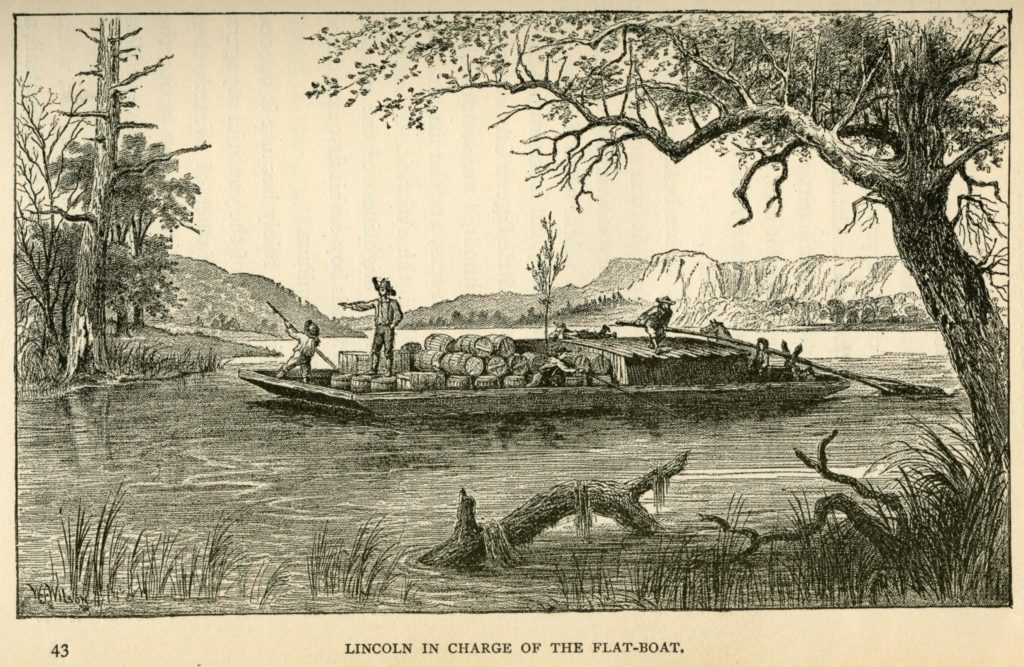Lincoln and the South
by E. Phelps Gay
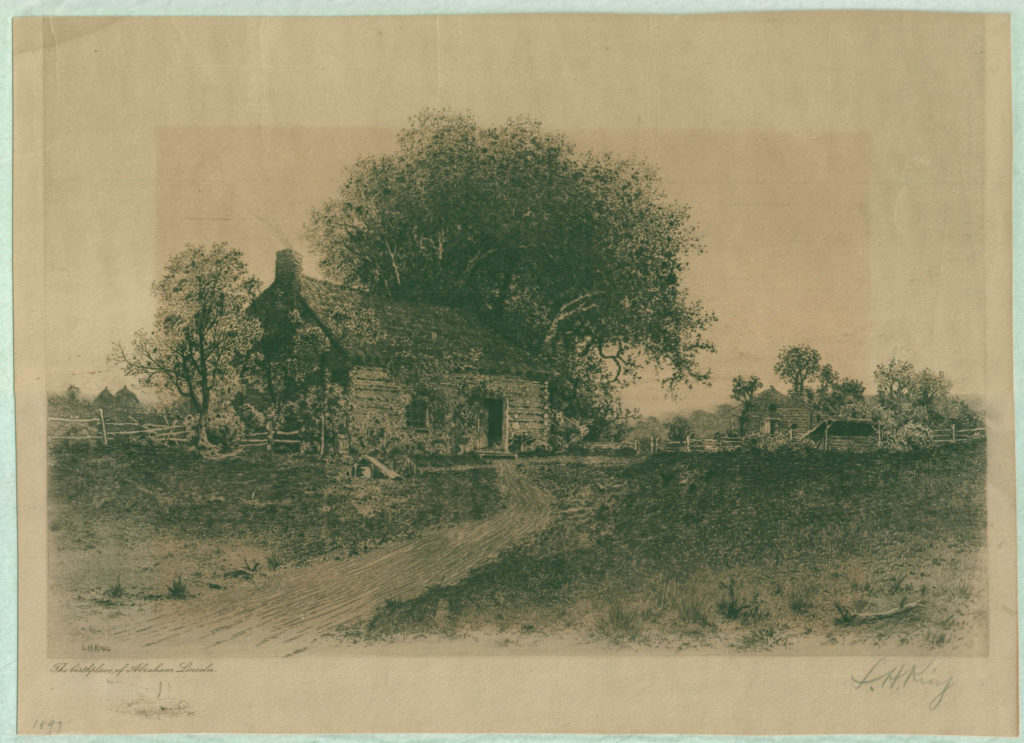
How did Lincoln view the South? What did he know about the South? Had he been to the South? Did he hate the South? Or, instead, did he like Southerners? Did he blame them for the evil institution of slavery? Did he see himself, as many Northerners did at the time (and perhaps as some still do today), as superior to Southerners? Was he “judgmental” about Southerners? Was he, the man who freed the slaves, actually an abolitionist? And, of course, if John Wilkes Booth had not shot Mr. Lincoln in the back of the head at Ford’s Theatre on the night of April 14, 1865, would Lincoln have approached Reconstruction in the South in a different manner from the Radical Republicans in Congress, and would Southern history—and the country’s history–have therefore taken a different turn?
Perhaps one way to answer these questions is to say that Lincoln was Southerner. He was born on February 12, 1809, in a log cabin on Sinking Spring farm on Nolin Creek in Hardin County, Kentucky, near the town of Hodgenville. In 1811, when he was two, his family moved eight miles to the northeast to another one-room cabin located on Knob Creek. This was situated along the Old Cumberland Trail.
Peopled mainly by Virginians, this was a decidedly Southern society, and Kentucky was a slave state. Records show that at that time Hardin County had about 1600 white men and about 1000 slaves. Travelers with slaves in tow often passed by where Lincoln lived along the Old Cumberland Trail. So as a boy it’s fair to say Lincoln saw slavery all around him.
In 1816, when Lincoln was seven, his parents moved from Kentucky across the Ohio River to southwestern Indiana. In a campaign autobiography written in 1860, Lincoln wrote that his family “removed to what is now Spencer County, Indiana, in the autumn of 1816 . . . partly on account of slavery; but chiefly on account of difficulty in land titles in Kentucky.” Land surveying in Kentucky was notoriously unreliable, so that Thomas Lincoln’s ownership of what he thought was his land—both on the Sinking Spring farm and the Knob Creek farm—was challenged, and he found himself on the losing end of litigation over his land titles. As for slavery, even now there seems to be some debate as to whether Lincoln’s parents disliked it primarily on moral grounds or because a small farmer and free laborer like Thomas Lincoln had trouble competing with people wealthy enough to own slaves—perhaps both.
On the whole, my impression is that Lincoln’s so-called “southern” upbringing is somewhat overstated. True, he was born in Kentucky, but he spent fourteen years—between the ages of seven and twenty-one—in the free state of Indiana, and his parents were anti-slavery. In later years he described himself as “naturally anti-slavery.” Still, I think Lincoln’s early experience also vouchsafed to him an understanding of, and even to some degree a sympathy with, people from the South. He never developed the kind of hatred of Southerners or feelings of moral superiority which characterized many Northern abolitionists. Temperamentally, he was not judgmental or “holier-than-thou.” But on the whole I would say Lincoln’s upbringing made him, culturally, more of a “westerner” than a “southerner.”
We don’t have much in the way of first-hand information about Lincoln’s two flatboat trips to New Orleans in 1828 and 1831. No primary documents exist such as journal entries by Lincoln or Gentry. We do know Lincoln referred to these trips in his 1860 campaign biography, and, most importantly, we have the wonderful book written by Tulane University geographer, Richard Campanella, called Lincoln in New Orleans, published in 2010. Without knowing exactly what young Abe Lincoln and Allen Gentry saw and experienced on their way down the river, Campanella does a meticulous job recreating what the two flatboat trips must have been like and what New Orleans looked like in 1828 and 1831. These two trips constitute Lincoln’s only visits to the Deep South.
Regarding the 1828 flatboat trip, Campanella believes Lincoln and Gentry built and launched the flatboat in Rockport, Indiana, and left in April 1828. The two young men poled and floated their way down the Ohio and Mississippi Rivers, a journey of some 1300 miles. Campanella calculates the flatboat traveled at a speed of five to six miles per hour, and the young men probably rested on the river bank each night. On the first part of their trip along the Ohio River, Lincoln would have seen the free north on his right (Indiana and then Illinois), and the slave south on his left (Kentucky). Once the Ohio gave way to the mighty Mississippi, navigating the flatboat became trickier. As they headed south, Lincoln and Gentry were surrounded by slavery. As Campanella describes it, when the boat got to Louisiana they saw “an increasingly humanized riverfront, with higher population levels, a larger number of slaves, frequent landings, more visible displays of wealth and enterprise, extensive plantation agriculture, and an increasingly subtropical ambience.”
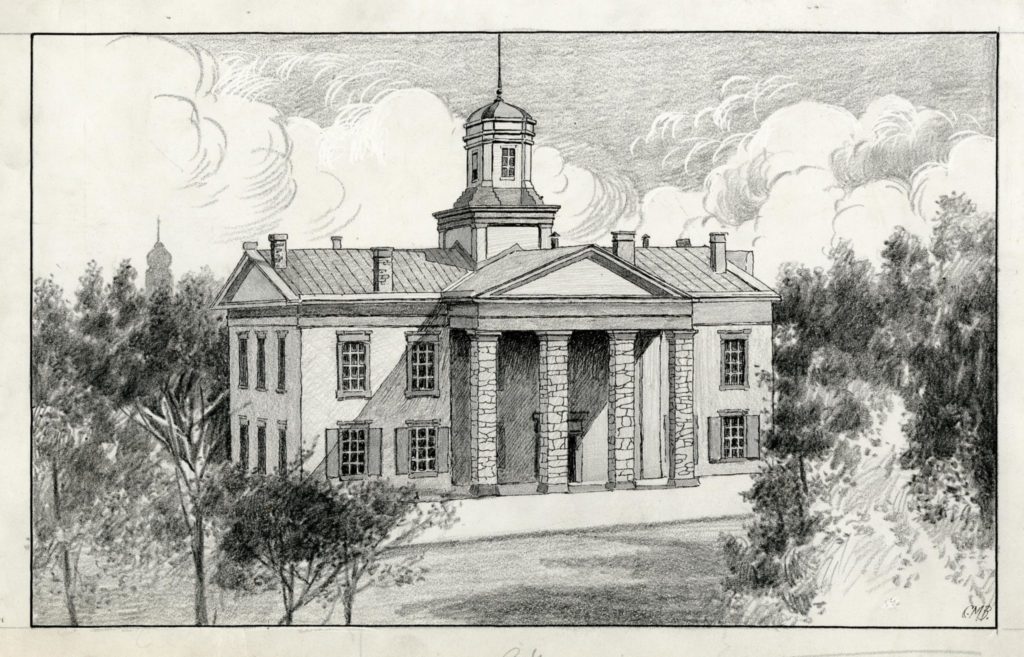
Speaking of himself in the third person, Lincoln wrote about this experience in June 1860:
When he was nineteen, still residing in Indiana, he made his first trip upon a flatboat to New Orleans. He was a hired hand merely, and he and a son of the owner, without other assistance, made the trip. The nature of part of the ‘cargo load,” as it was called, made it necessary for them to linger and trade along the sugar-coast; and one night they were attacked by seven negroes with intent to rob and kill them. They were hurt some in the melee, but succeeded in driving the negroes from the boat, and then “cut cable,” “weighed anchor,” and left.
Campanella thinks Lincoln and Gentry probably “lingered and traded” along the sugar coast for a week. He also speculates that the encounter with the “seven negroes” occurred about sixty miles north of New Orleans, on the east bank of the river, in St. James Parish, at or near the Convent of the Sacred Heart, founded by one Rose Phillipine Duchesne. Reconstructing the episode from stories gathered by Lincoln’s law partner William Herndon after Lincoln’s death, Campanella says that in response to this attack Allen Gentry pulled off quite a successful bluff. The story goes that Gentry hollered to Lincoln, “Lincoln, get the guns,” whereupon Lincoln went to “get the guns,” when the truth was they didn’t have any guns. Supposedly the attackers were fooled and ran away. Campanella believes the attackers were probably fugitive slaves from a nearby plantation.
As Campanella reconstructs it, they docked at a flatboat wharf located in the Warehouse District or Lower Garden District. They would have sold the rest of their cargo right away. New Orleans was by far the largest city Lincoln had ever seen, consisting of some 50,000 people, including many slaves as well as free blacks. It was the center of the domestic slave trade, with many slave pens and slave auctions. As historian Eric Foner writes, “[i]t would have been almost impossible to spend time in New Orleans and not witness the buying and selling of slaves.” Campanella believes that Lincoln probably visited Hewlett’s Exchange, located at the corner of Chartres and St. Louis streets, the busiest slave mart in the city. Otherwise, there was gambling and vice aplenty, but Lincoln was notoriously abstinent. Lincoln took a second flatboat trip to New Orleans in 1831, a trip which he took at the request of an Illinois merchant named Denton Offutt. Accompanying Lincoln on this trip were John Hanks (his mother’s cousin), John Johnston (his step-brother) and probably Mr. Offutt himself.
When Lincoln was twenty-one, his family moved again, this time to Illinois. In 1818, Illinois was admitted to the Union as a free state, although we should be careful to note that the absence of slavery by no means meant the people of Illinois entertained any idea of equality between the races. In 1819, Illinois adopted what were known as Black Codes, under which black people could not vote, could not testify in court, and had to carry papers certifying their status as free. In general, it may be said that neither Indiana nor Illinois wanted or encouraged free blacks to migrate to their state—indeed, it was considered a crime to bring slaves into the state with the intent of freeing them—and most people in Illinois harbored a prejudice against African-Americans which existed in the Southern slave states and even in most Northern states. To some degree, it must be acknowledged, this prejudice applied to Lincoln himself.
Shifting to Lincoln’s experience in Illinois as a state legislator, particularly his vote on a resolution introduced in the Illinois House of Representatives in January 1837. While the record is clear that Lincoln disliked slavery, he was not an abolitionist. He was not, I would say, radical by temperament or revolutionary in his policy. Eric Foner writes: “Lincoln disliked the intemperate language of evangelical reformers. This is one reason why he never identified himself with abolitionists.” In Lincoln’s speeches, Foner notes, he would often “denounce slavery but not slave owners.”
In January of 1837, the governor of Illinois asked the General Assembly to respond to appeals from the legislatures of Virginia, Kentucky, Alabama, and Mississippi to do something to stamp out what they regarded as the “menace” of abolitionism, which had arisen during the 1830s. A joint legislative committee drafted a statement which expressed “a deep regard and affection for our brethren of the South.” The committee further resolved that “the purposes of the abolitionists are highly reprehensible, and that their ends, even if peaceably attained, would be productive of the most deleterious consequences for every portion of the Union.”
In the Illinois House of Representatives the vote was seventy-seven in favor of this resolution, five opposed. One of the five voting “nay” was twenty-eight-year-old Abraham Lincoln. Six weeks later, on March 3, 1837, Lincoln and fellow state representative Dan Stone set forth their reasons for voting against the resolution. “They believe that the institution of slavery is founded on both injustice and bad policy; but that the promulgation of abolition doctrines tends rather to increase than to abate its evils.” They gave two other reasons: they believed Congress had no power under the Constitution to interfere with the institution of slavery in the states; and while Congress did have the power to abolish slavery in the District of Columbia, they believed that power should not be exercised except at the request of the people of the District.
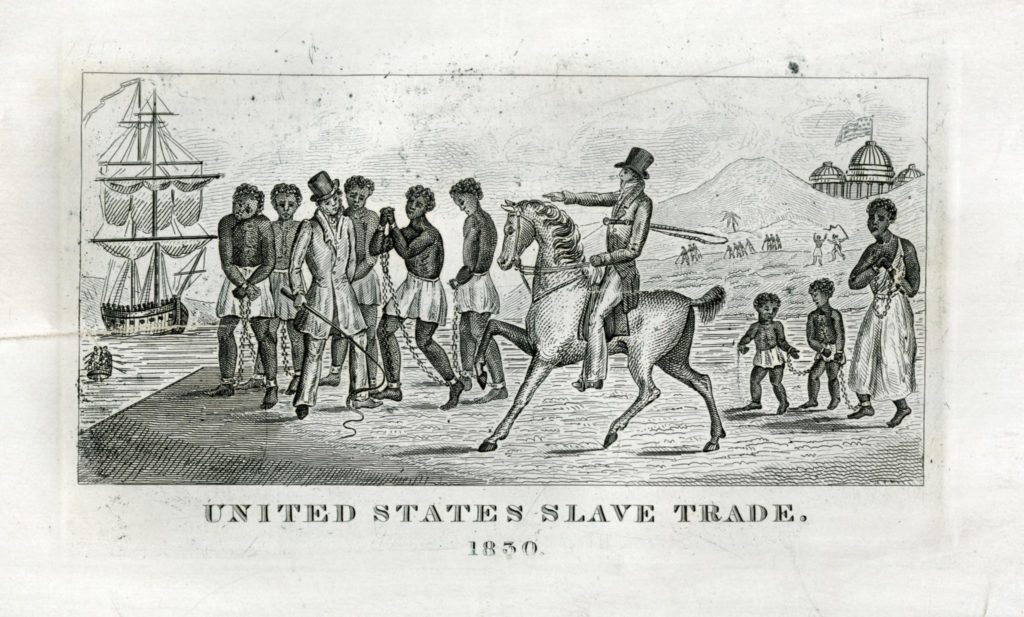
To better understand Lincoln’s relationship to the South, let’s turn to another key moment in his life: the day he arrived in Springfield, Illinois. Twenty-eight years old, he had just ridden his horse over from the little town of New Salem, where he had lived from 1831 to 1837. On April 15, 1837, at a general store on the courthouse square, he met a young man named Joshua Speed, who was to become Lincoln’s best, and some say his only, intimate friend. Five years younger than Lincoln, Speed came from a well-to-do Kentucky family that owned a plantation near Louisville called Farmington. Looking at the poorly dressed and virtually broke Abraham Lincoln, Speed took pity on him. He told Lincoln, who was looking for a place to stay, that he had a large double bed in a room above the store, and Lincoln was welcome to share it with him.
In 1841, Lincoln
went to visit Speed at his family’s plantation, staying for nearly a month in the family’s fourteen-room brick house on beautiful grounds. The “luxury and leisure of Southern society,” notes historian David Herbert Donald, “were on full display, and a house slave was assigned to take care of Lincoln’s every need.”
After his sojourn, Lincoln and Speed took a steamboat down the Ohio River from Louisville to St. Louis. From there Lincoln was going to return to Springfield by stagecoach. On board this steamboat were twelve slaves being sold down the river—that is, being separated from their wives and children. Lincoln’s letters show how he responded to the sight of these slaves, but they are not, as we will see, exactly consistent.
His letter to Mary Speed, Joshua Speed’s half-sister, was written on September 27, 1841. Lincoln observed the slaves chained and strung together, he wrote, “like so many fish upon a trot line.” In this condition they were being separated forever from the scenes of their childhood, their friends, their fathers and mothers, brothers and sisters, and many of them, from their wives and children, and going into perpetual slavery where the lash of the master is proverbially more ruthless and unrelenting than any other where; and yet amid all these distressing circumstances, as we would think them, they were the most cheerful and apparently happy creatures on board.”
Historian Eric Foner accurately describes this letter as “oddly dispassionate” about the cruelty of slavery, speculating that perhaps Lincoln was trying not to offend the Speed family, which owned slaves.
Now let’s look at the letter Lincoln wrote to Joshua Speed fourteen years later, on August 24, 1855, in which Lincoln recalls the experience a bit differently:
“In 1841 you and I had together a tedious low-water trip, on a Steam Boat from Louisville to St. Louis. You may remember, as I well do, that from Louisville to the mouth of the Ohio, there were, on board, ten or a dozen slaves, shackled together with irons. That sight was a continual torment to me; and I see something like it every time I touch the Ohio, or any other slave border. It is hardly fair for you to assume, that I have no interest in a thing which has, and continually exercises, the power of making me miserable. You ought rather to appreciate how much the great body of the Northern people do crucify their feelings, in order to maintain their loyalty to the Constitution and the Union.”
Nevertheless, it should be noted that Lincoln and Speed remained good, if somewhat distant, friends, till the end. After he was elected president in 1860, Lincoln asked Speed to consider a position in his administration. Speed declined, but he became Lincoln’s most trusted intermediary in the critical state of Kentucky, which, as we know, never seceded. He persuaded banks in Louisville to help raise money for Union troops, and he recommended to Lincoln many loyal Kentuckians for military and civil appointments.
In 1842, Lincoln married Mary Todd. The Todds of Lexington, Kentucky, were a well-to-do, influential, slave-owning family, and they were great friends of Lincoln’s hero, Henry Clay. In fact, so proud and self-important were the Todds that Lincoln once quipped: “One ‘d’ was good enough for God, but not the Todds.”
Lincoln’s first law partner was a man named John Todd Stuart. When Lincoln married Stuart’s cousin, Mary Todd, he became part of a slaveholding family. And yet Mary’s father, Robert S. Todd, a Kentucky state legislator, was, like Henry Clay, one of those Kentucky slaveholders who owned slaves but disliked slavery and hoped to see it gradually abolished in the state. His daughter Mary seems to have absorbed this view. From what we know, Lincoln was fairly close to his wife’s family. He made several visits to Lexington, which was a major slave-trading center, and he spent nearly a month there in 1847 on his way to serve in Congress. When his father-in-law died in 1849, Lincoln handled litigation arising out of his estate.
So here we have a man who was naturally anti-slavery but who knew and lived among slaveholders and who did not join with those whose avowed mission in life was to abolish the institution of slavery where it existed. To many abolitionists the U.S. Constitution was a “pact with the devil,” in that it recognized and approved the institution of slavery. Decidedly, this was not Lincoln’s view.
As noted, his “beau ideal” of a statesman was Henry Clay, one of the founders of the American Colonization Society. Lincoln also supported the idea of gradual emancipation of slaves and “colonizing” them in Africa or Central America. As late as August 1862, Lincoln broached this subject with certain prominent black leaders at the White House (to which they understandably took great offense), and the idea of colonization is even mentioned in the Preliminary Emancipation Proclamation issued in September 1862, after the Battle of Antietam. The final version of the Proclamation, issued on January 1, 1863, is thankfully silent on this subject.
The truth is that Lincoln did not publicly embrace opposition to slavery as a cause until Congress passed the Kansas-Nebraska Act in 1854. This Act effectively repealed the Missouri Compromise of 1820 and opened up the possibility of slavery extending into the federal territories. Lincoln considered slavery a dying institution, and he believed the Founders thought it was (and should be) “in the course of ultimate extinction.” He recognized that it was protected by the U.S. Constitution, even if rather sheepishly—as many have noted the words “slavery” and “slave” do not appear in the document, although slavery is unmistakably present in the three-fifths clause and the fugitive slave clause. And so, short of amending the Constitution, Lincoln did not believe he had any power to interfere with the institution of slavery where it existed in the Southern states. In his First Inaugural Address delivered on March 4, 1861, he not only said he had no such power, he explicitly said he had no intention of interfering with slavery in the South.
But, as to the federal territories, in 1854 Lincoln took a stand. The federal government did have the right to prohibit slavery in the federal territories, just as they had prohibited it in the Northwest Ordinance of 1787, and Lincoln did not want to see slavery expand beyond its current borders. He approved of the Missouri Compromise of 1820, supported by his hero Henry Clay.
In his speech delivered in Peoria, Illinois, on October 16, 1854, Lincoln explained why he opposed the spread of slavery made possible by the Kansas-Nebraska Act. He also spoke eloquently about why he hated slavery altogether.
“I hate it because of the monstrous injustice of slavery itself. I hate it because it deprives our republican example of its just influence in the world—enables the enemies of free institutions, with plausibility, to taunt us as hypocrites—causes the real friends of freedom to doubt our sincerity, and especially because it forces so many really good men amongst ourselves into an open war with the very fundamental principles of civil liberty—criticizing the Declaration of Independence, and insisting there is no right principle of action but self-interest.”
But then—and this is especially significant for our purposes–listen to what Lincoln said next:
Before proceeding, let me say that I think I have no prejudice against the Southern people. They are just what we would be in their situation. If slavery did not now exist amongst them, they would not introduce it. If it did now exist amongst us, we should not instantly give it up. This I believe of the masses north and south . . .
When southern people tell us they are no more responsible for the origin of slavery, than we; I acknowledge the fact. When it is said that the institution exists, and that it is very difficult to get rid of it, in any satisfactory way, I can understand and appreciate the saying. I surely will not blame them for not doing what I should not know how to do myself. If all earthly power were given me, I should not know what to do, as to the existing institution.
. . . It does seem to me that systems of gradual emancipation might be adopted; but for their tardiness in this, I will not undertake to judge our brethren of the south.
Indeed, Lincoln’s attitude toward the South may be best described as non-judgmental. He did not abuse the Southern slaveholder as a wicked person. North and South, he believed, must share the blame. Certainly much of the American North shared in profits from the so-called peculiar institution.
Some scholars, such as Robert Johannsen, believe there was an element of political opportunism in Lincoln’s sudden anti-slavery stance in 1854, as expressed in his speech at Peoria. After all, critics note, Lincoln had been fairly quiet on the subject up until then. And we should keep in mind something not always easy to do when talking about a person about whom thousands of books have been written—and that is that Lincoln was a relatively obscure person in 1854. He had served in the Illinois legislature as a young man, and he had served one undistinguished term in Congress from 1847 to 1849. After that he returned to Springfield and practiced law, riding around the counties of the Eighth Judicial Circuit in central Illinois. His political career seemed to be over.
But the Kansas-Nebraska Act lit a fire, and from the Peoria Speech on his political star began to rise. Both his moral indignation and his restless ambition—William Herndon characterized Lincoln’s ambition as “a little engine that knew no rest”—were ignited, and Lincoln was thereafter almost never out of the public eye. He ran for the U.S. Senate in 1855, and he ran again in 1858, starting off with the House Divided Speech, and then engaging in seven great debates around the state with the author of the Kansas-Nebraska Act, Senator Stephen A. Douglas. In February of 1860, he delivered his famous Cooper Union address in New York City, and in May of 1860 he won the Republican Party’s nomination for president.
In his excellent book, Lincoln’s Virtues, an Ethical Biography, William Lee Miller writes: “From the speech at the state fair in Springfield on October 4, 1854, [this was just before the Peoria speech] until his Second Inaugural on March 4, 1865, he treated the monstrous injustice of slavery . . . as the responsibility of the entire nation.” In Lincoln’s view the war was caused by slavery, a condition in which not just the South but the whole nation was implicated.
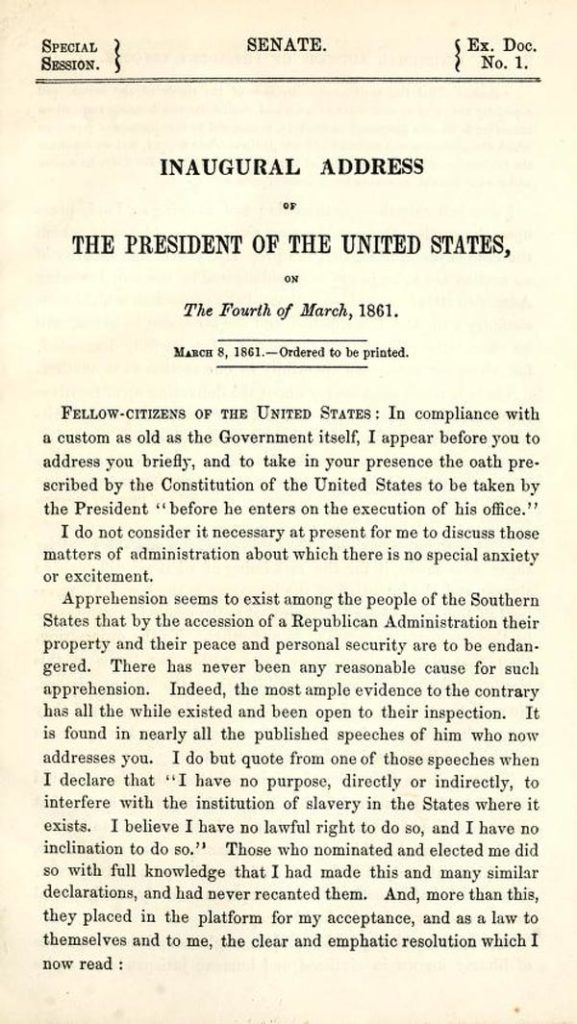
In his First Inaugural Address, on March 4, 1861, Lincoln tried mightily to extend an olive branch to the South. “I have no purpose,” he said, “directly or indirectly, to interfere with the institution of slavery in the States where it exists. I believe I have no lawful right to do so, and I have no inclination to do so.” He even said—and this was quite remarkable—he did not object to a proposed constitutional amendment (known as the Corwin Amendment) which would permanently bar any federal interference with slavery. He pleaded for southerners to “think calmly and well.” “Nothing valuable,” he said, “can be lost by taking time. In your hands, my dissatisfied fellow countrymen, and not in mine, is the momentous issue of civil war. The government will not assail you. You can have no conflict without yourselves being the aggressors.”
And, of course, at the end, in a famous peroration, he said:
“I am loth to close. We are not enemies, but friends. We must not be enemies. Though passion may have strained, it must not break our bonds of affection. The mystic chords of memory, stretching from every battle-field, and patriot grave, to every living heart and hearthstone, all over this broad land, will yet swell the chorus of the Union, when again touched, as surely they will be, by the better angels of our nature.”
Shortly after the First Inaugural, in a speech delivered in Hartford, Connecticut, Lincoln said: “In this we do not assume that we are better than the people of the South—neither do we admit that they are better than we. We are not better, barring circumstances, than they.”
To the end, Lincoln declined to demonize or vilify his fellow countrymen. One night in July 1862, at the Soldiers’ Home outside of Washington, D.C., according to a clergyman named Elbert S. Porter, Lincoln said this about slavery:
“It is part of our national life. It is not of yesterday. It began in colonial times. In one way or another it has shaped nearly everything that enters into what we call government. It is as much northern as it is southern. It is not merely a local or a geographical institution. It belongs to our politics, our industries, to our commerce, and to our religion. Every portion of our territory in some form or another has contributed to the growth and the increase of slavery. It has been nearly two hundred years coming up to its present proportions. It is wrong, a great evil indeed, but the South is no more responsible for the wrong done to the African race than is the North.”
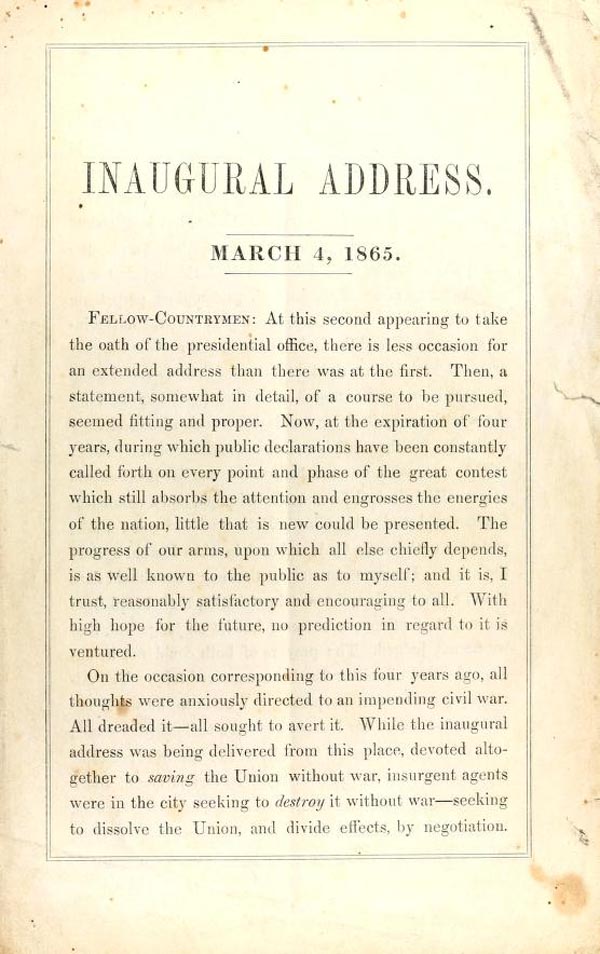
The Second Inaugural captures the essence of my message, which is that Lincoln had a deep affection for all of his countrymen, North and South, and he possessed an unusually profound wisdom about what the country had endured. After describing the events leading up to the war, he said this about the North and the South:
“Both read the same Bible, and pray to the same God; and each invokes His aid against the other. It may seem strange that any men should dare to ask a just God’s assistance in wringing their bread from the sweat of other men’s faces; but let us judge not that we be not judged.” And, of course, he concluded by saying “with malice toward none, with charity for all, let us bind up the nation’s wounds and do all which may achieve and cherish a just and lasting peace.” Historian Lewis Lehrman accurately notes that this speech, given at a time when the war was almost over and the outcome not in doubt, reveals a remarkable “absence of triumphalism.”
One final counterfactual subject—what would Reconstruction in the South have looked like had Lincoln not been assassinated? I think it is likely that, had Lincoln lived, it would have taken a different form. According to James Randall, the Radical Republicans in Congress “desired not only the liberation of black slaves; they desired vengeance upon the South and yearned for a regime of party domination.” Lincoln’s attitude toward the South was never vindictive. At Appomattox, we know that Grant offered Lee generous terms of surrender—Confederate soldiers would be paroled; officers could keep their side-arms and their horses; and rations were provided for Lee’s starving men. There would be no imprisonment, trials, or executions. The defeated soldiers would simply go home.
In his last speech, on the night of April 11, 1865, three days before he was shot, Lincoln spoke from the north portico of the White House. The crowd was in a celebratory mood, but instead of basking in the glory of Union victory, Lincoln chose to address what some thought was a fairly boring subject: namely, reconstruction in Louisiana. Ever since the Union Navy, led by Flag Officer David Farragut, had fought its way past Forts Jackson and St. Phillip and taken over New Orleans in April 1862, Lincoln had expressed keen interest in helping Louisiana return to the Union it had left. He wanted to—and did—move past the appointment of military governors to support passage of a new state constitution which prohibited slavery and allowed for the possibility of suffrage for African-Americans. Indeed, in his Annual Message to Congress in December, 1863, he proposed a Proclamation of Amnesty and Reconstruction, under which states in rebellion would be restored to the nation if one-tenth of the number of eligible voters who had participated in the election of 1860 established a loyal government and adopted a state constitution abolishing slavery.
But many in Congress considered Lincoln much too lenient toward the conquered Confederates and opposed his plan for reconstruction in Louisiana. Despite the fact that 12,000 voters in Louisiana had sworn allegiance to the Union, held elections, adopted a constitution abolishing slavery, and provided for public schooling of African-Americans, as of April 11, 1865, Louisiana had not yet been readmitted to the Union. In his speech that night, Lincoln for the first time suggested that certain African-Americans—the so-called “very intelligent” and those who had fought for the Union cause—should be allowed to vote. He was moving, some maintain, toward universal suffrage. But, of course, a certain actor in the crowd became incensed at these words and vowed this would be the last speech President Lincoln would ever make. And it was.
As historian Louis Masur notes in his thoughtful book, Lincoln’s Last Speech, it can never be known whether Reconstruction would have turned out differently had Lincoln lived. “All that can be said with certainty concerns character, not policy, and Lincoln’s character did not allow politics to become personal.” Masur adds: “There is every reason to believe that after the war he would have moved the nation toward a political reconstruction that did not forsake Southern loyalists and a social reconstruction that may not have provided the freedmen with all that the radicals envisioned but would have afforded more by way of government support and protection than Southern blacks ended up receiving.”
But, as Masur acknowledges, we cannot know this for sure, and it is probably a little too easy to glorify the martyred president by saying all would have been well had he lived. Sometimes, as has been said, making peace is harder than making war. What matters is that from 1861 to 1865, during our country’s greatest conflagration, we were led by a humble man, originally from a border slave state, whose level of wisdom and eloquence we still marvel at today and whose most fervent wish was for his countrymen, including his friends in the South, to come back together, with a new birth of freedom, with malice toward none and charity for all.
[editor’s note: E. Phelps Gay practices law in New Orleans, LA. This text was previously presented to the Louisiana Historical Society in New Orleans on October 13, 2015.]
Roy P. Basler, ed., The Collected Works of Abraham Lincoln (Rutgers University Press, 1953)
Richard Campanella, Lincoln in New Orleans: The 1828-1831 Flatboat Voyages and Their Place in History (University of Louisiana at Lafayette Press, 2010)
David Herbert Donald, Lincoln (Simon & Schuster, 1995)
Don E. Fehrenbacher and Virginia Fehrenbacher, Recollected Words of Abraham Lincoln (Stanford University Press, 1996)
Eric Foner, The Fiery Trial: Abraham Lincoln and American Slavery (W.W. Norton, 2010)
Robert W. Johannsen, Lincoln, The South, and Slavery: The Political Dimension (Louisiana State University Press, 1991)
Louis P. Masur, Lincoln’s Last Speech: Wartime Reconstruction and the Crisis of Reunion (Oxford University Press, 2015);
William Lee Miller, Lincoln’s Virtues: An Ethical Biography (Alfred A. Knopf, 2002)
James G. Randall, Lincoln and the South (Louisiana State University Press, 1946)
Douglas L. Wilson and Rodney O. Davis, Herndon’s Informants: Letters, Interviews, and Statements about Abraham Lincoln (University of Illinois Press, 1997)

